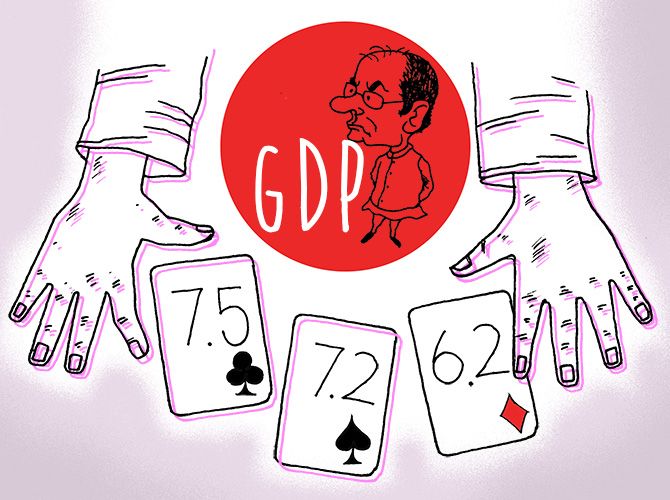As yields rise, bond prices fall. Higher yields not only translate into losses for investors, it also pushes up borrowing cost for companies as well as government
Illustration: Dominic Xavier/Rediff.com

Various estimates suggest that India could grow at 7.5 per cent this fiscal, but such a growth rate would likely be hampered if the interest rates remain at elevated levels.
The 10-year yields on government bonds (G-secs) are a good gauge of the medium term interest rate trajectory, and those yields are on the rise.
The foreign portfolio investors (FPIs) are liquidating their fixed income portfolio, and at an increasing pace in the past three months, leaving the market at the hands of domestic money. That seemed to be not enough.
At the start of September, 2017, the 10-year G-sec yields were at 6.48 per cent. It closed April at 7.77 per cent, a whopping rise of 129 basis point.
As yields rise, bond prices fall. Higher yields not only translate into losses for investors, it also pushes up borrowing cost for companies as well as government.
This, in turn, leads to pull back on investments and economic growth suffers as a result.
After being positive in January, FPIs have been selling their fixed income investments.
In April, FPIs sold Rs 12,117 crore of their holding in bonds, more than the combined Rs 8,000 crore selling they undertook in the previous two months.
To stop this outflow, the Reserve Bank of India (RBI) late on Friday allowed foreign investors to invest in any maturity they want. Earlier, foreigners were only allowed to invest in fixed income papers maturing in more than three years.
The move came after it was apparent that the rising yields have not spared India’s best companies.
Highly rated companies were paying a steep price for short-term money as liquidity in the market has dried up in the absence of participation from banks.
In this context, the RBI could not have let the FPIs leave.
The relaxations could well support short-term yields for now, but it won’t necessarily address the underlying pressure points of bonds in the long run.
“The relaxation of FPI rules could ease pressure on the front end, but relief will only be tactical, in our view, as rate hike expectations and oil price uncertainty still weigh on the bond markets. As such, we remain neutral on Indian bond markets,” said Nomura in a report.
The main issue domestically is that banks, the largest group of investors in government bonds, are not investing enough fearing rising yields going forward.
Banks don’t want to incur further losses at a time when they are battling increased provisioning costs on their bad loans.
“Banks are sitting out and nobody knows when they would be back,” said a senior bond trader.
Banks are required to invest 19.5 per cent of their deposits in government bonds, but the actual holding could be as high as 27 per cent of their deposit base.
The bond investments rose at a time when liquidity was plenty post-demonetisation, while avenues to disburse the money was less at a time when credit growth was below 5 per cent.
The rise in US bond yields though has direct implications for Indian borrowers in international markets as the borrowings are linked to US treasury yields.
The rise in yields pose challenges for Indian companies in both domestic and foreign markets.
The rates for Indian companies in foreign shores have already risen some 60-70 basis points in the past few months, experts say.
And now that US 10-year yields have risen to 3 per cent after about four years, the foreign investors are finding lesser reasons to stay invested in India.
“FPIs are looking for reasons to underweight India,” said a senior economist of a foreign bank.
Manish Wadhawan, managing director and head of fixed income at HSBC India, says, if the US rates climb higher, they might impact fresh allocation to emerging markets, including India, resulting in sluggish FPI flows.
With oil and commodities also running up, it can have some negative impact on the rupee too, according to Wadhawan.












 © 2025 Rediff.com -
© 2025 Rediff.com -